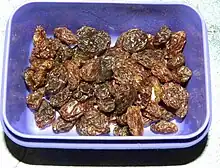كشمش
Arabic
Etymology
From Classical Persian کشمش (kišmiš, “raisin”).
Pronunciation
- IPA(key): /kiʃ.miʃ/
Noun
كِشْمِش • (kišmiš) m
- (Iraq, Syria, Kuwait, Bahrain, dated in Egypt) raisins, in particular sultanas
- Hypernym: زَبِيب (zabīb)
- a. 1222, نَجِيب الدِّين السَّمَرْقَنْدِيّ [najīb ad-dīn as-samarqandiyy], edited by Juliane Müller, كِتَاب الْأَغْذِيَة وَٱلْأَشْرِبَة [kitāb al-ʔaḡdiya wa-l-ʔǎšriba] (Islamic Philosophy, Theology and Science. Texts and Studies; 101), Leiden: Brill, published 2017, →ISBN, page 132:
- الكِشمِش شبيه بالزبيب إلا أنّه ألين قبضًا وأسهل خروجًا.
- Sultanas are similar to raisins except that they are of softer astringency and easier in excretion.
- currant (Ribes gen. et spp.)
- Synonym: رِيبَاس (rībās)
- Hyponyms: عِنَب الذِئْب (ʕinab aḏ-ḏiʔb), عِنَب الثَعْلَب (ʕinab aṯ-ṯaʕlab), كِشْمِش أَسْوَد (kišmiš ʔaswad)
References
- Behnstedt, Peter, Woidich, Manfred (2012) Wortatlas der arabischen Dialekte – Band II: Materielle Kultur (Handbook of Oriental Studies – Handbuch der Orientalistik; 100/II) (in German), Leiden, The Netherlands: Brill, , →ISBN, pages 278–279
Ottoman Turkish

كشمش
Alternative forms
- كشمشك (kişmişk)
Etymology
Borrowed from Classical Persian کشمش (kišmiš, “raisin”).
Descendants
- Turkish: kişmiş
- → Armenian: քիշմիշ (kʻišmiš), քիշնիշ (kʻišniš)
Further reading
- Çağbayır, Yaşar (2007) “kişmiş”, in Ötüken Türkçe Sözlük (in Turkish), volume 1, Istanbul: Ötüken Neşriyat, page 2690
- Hindoglu, Artin (1838) “كشمش”, in Hazine-i lûgat ou dictionnaire abrégé turc-français, Vienna: F. Beck, page 391b
- Kélékian, Diran (1911) “كشمش”, in Dictionnaire turc-français, Constantinople: Mihran, page 1029
- Meninski, Franciszek à Mesgnien (1687) “Uva passa”, in Complementum thesauri linguarum orientalium, seu onomasticum latino-turcico-arabico-persicum, simul idem index verborum lexici turcico-arabico-persici, quod latinâ, germanicâ, aliarumque linguarum adjectâ nomenclatione nuper in lucem editum, Vienna, column 1799
- Meninski, Franciszek à Mesgnien (1680) “كشمش”, in Thesaurus linguarum orientalium, Turcicae, Arabicae, Persicae, praecipuas earum opes à Turcis peculiariter usurpatas continens, nimirum Lexicon Turkico-Arabico-Persicum, Vienna, column 3968
- Nişanyan, Sevan (2002–) “kişmiş”, in Nişanyan Sözlük
- Redhouse, James W. (1890) “كشمش”, in A Turkish and English Lexicon, Constantinople: A. H. Boyajian, page 1553
This article is issued from Wiktionary. The text is licensed under Creative Commons - Attribution - Sharealike. Additional terms may apply for the media files.